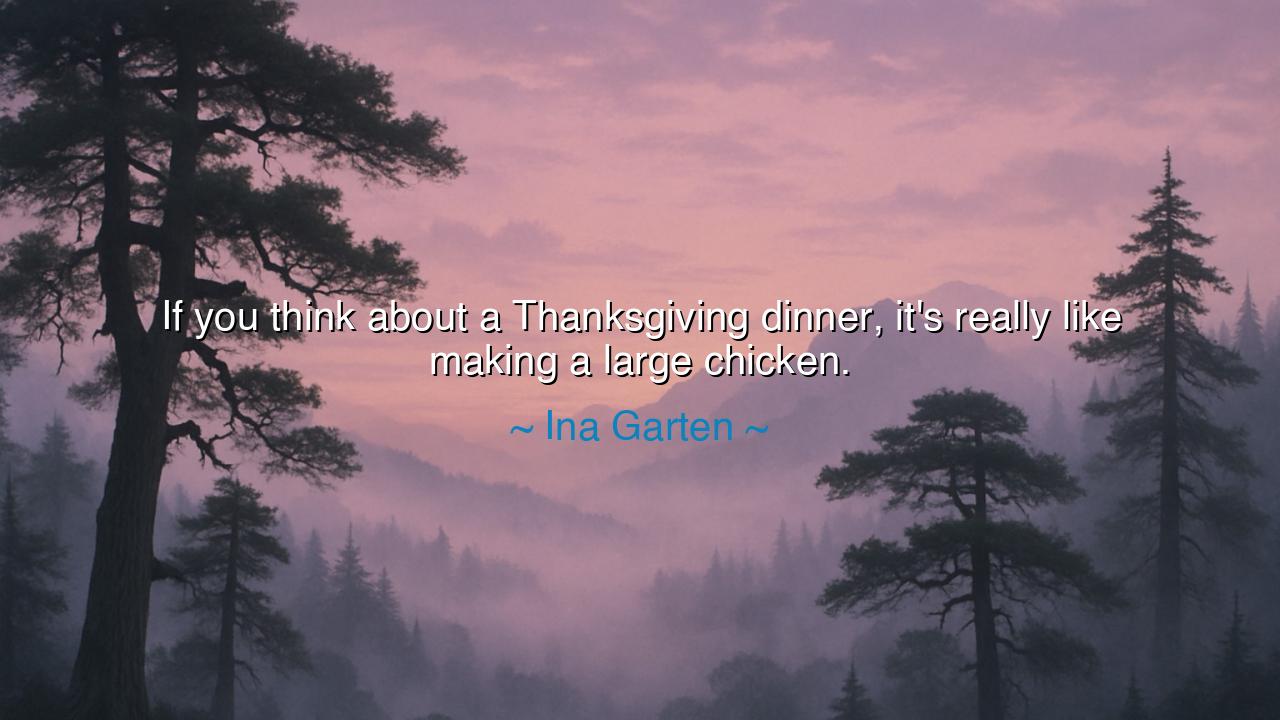
If you think about a Thanksgiving dinner, it's really like






"If you think about a Thanksgiving dinner, it's really like making a large chicken." In this humble yet profound observation, Ina Garten offers more than a piece of culinary advice. She strips away the fear that surrounds the great feast of Thanksgiving and shows that what seems overwhelming is, at its heart, simple. The enormous turkey, symbol of abundance and tradition, is in truth only a larger version of something familiar, something we have already mastered. Her words are a lesson not just for the kitchen, but for life itself: the great and the daunting are often nothing more than the ordinary, magnified.
The origin of this teaching lies in the wisdom of perspective. Many tremble before the expectations of Thanksgiving, fearing they cannot meet the standard of perfection demanded by family, culture, or memory. The turkey looms as a mountain impossible to climb. But Garten reminds us that the mountain is only a hill, the turkey only a chicken writ large. To see things clearly, without illusion, is the beginning of mastery. Fear shrinks when seen for what it truly is.
History shows us how this principle has played out in many arenas. Consider George Washington, who at the outset of the Revolution faced the greatest empire on earth. To his men, it seemed an impossible foe. Yet Washington taught them to think of it not as an immovable giant, but as an army like any other—larger, yes, but vulnerable, fallible, human. With this shift in perspective, victory became possible. Just as the cook must see the turkey as a chicken, so too must the warrior see the mighty foe as flesh and blood, subject to the same limits as all men.
There is also a spiritual truth here. Life often overwhelms us with duties and burdens that appear enormous—loss, responsibility, the weight of choices. Yet, when broken down, these burdens are no different than the smaller struggles we have already endured. We have cooked many chickens before; we can cook a turkey. We have survived small trials; therefore, we can endure great ones. The soul must be taught to translate fear into familiarity, to recognize in the immense the same patterns that sustained us in the small.
Garten’s words also speak to humility. For while Thanksgiving is a grand feast, it is not beyond the reach of ordinary hands. It does not require secret arts, only patience, care, and love. The greatest feasts, like the greatest works of life, are built from simple elements done faithfully. A turkey is but a chicken, gratitude but an expanded form of daily kindness, the feast but an enlargement of the meal shared every night. When we see this, we learn that the extraordinary is only the ordinary, faithfully magnified.
The lesson for future generations is this: do not fear what looms large before you. The great challenges are but familiar ones in larger form. Approach them as you would a chicken, and you will find them manageable. Whether it be raising a family, leading a people, or preparing a feast, the skills you already possess are the foundation for success. Fear makes giants; perspective makes them small again.
Practical action flows from this wisdom. When overwhelmed by a task, break it into what you already know. In the kitchen, treat the turkey as a chicken. In life, treat the giant as a man, the mountain as a series of steps. Focus on what is familiar, and build from there. Let no feast or challenge frighten you into despair, for you already hold the knowledge to prevail.
Thus, Ina Garten’s words, wrapped in the language of cooking, become a timeless truth: the extraordinary is often only the ordinary, seen at scale. To recognize this is to strip fear of its power, to stand calmly before life’s demands, and to walk forward in confidence, knowing that what we have done in little, we can do in much. This is the secret not only of Thanksgiving, but of living itself.






AAdministratorAdministrator
Welcome, honored guests. Please leave a comment, we will respond soon